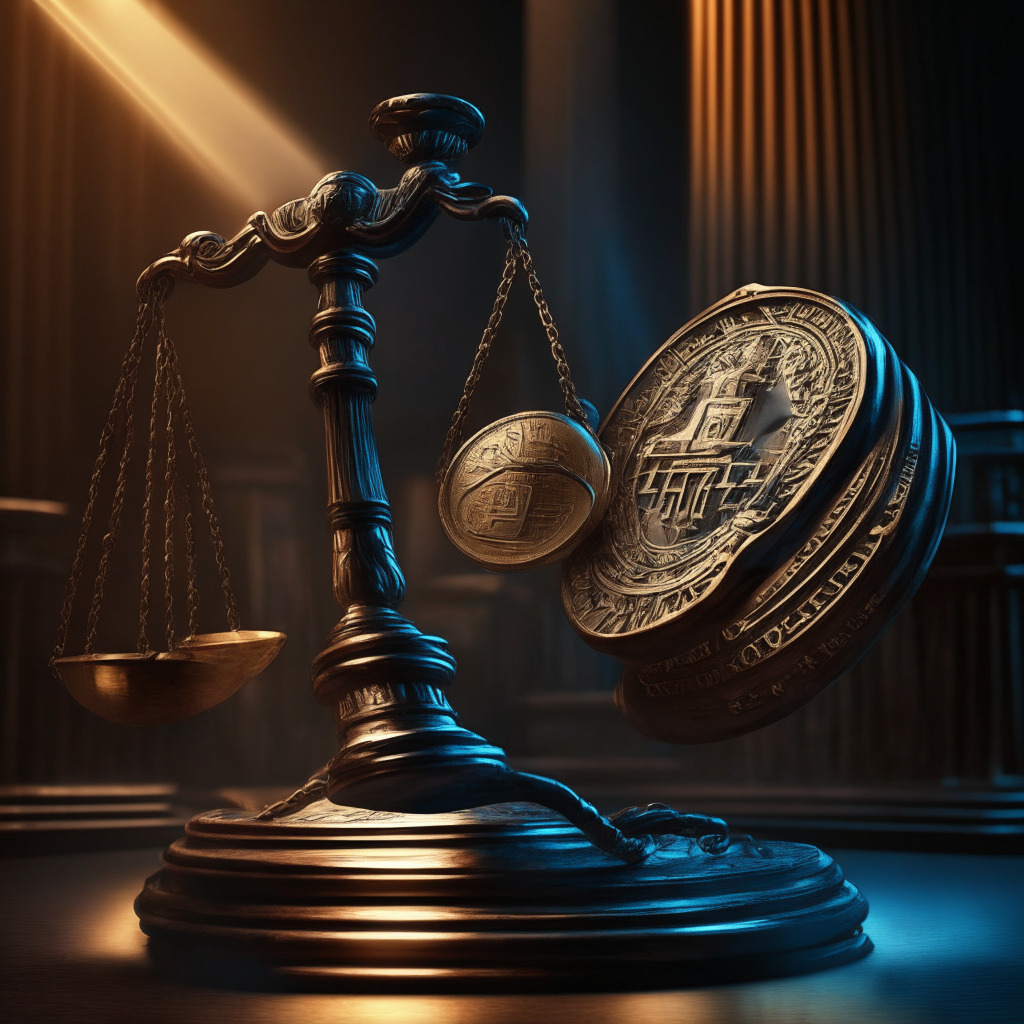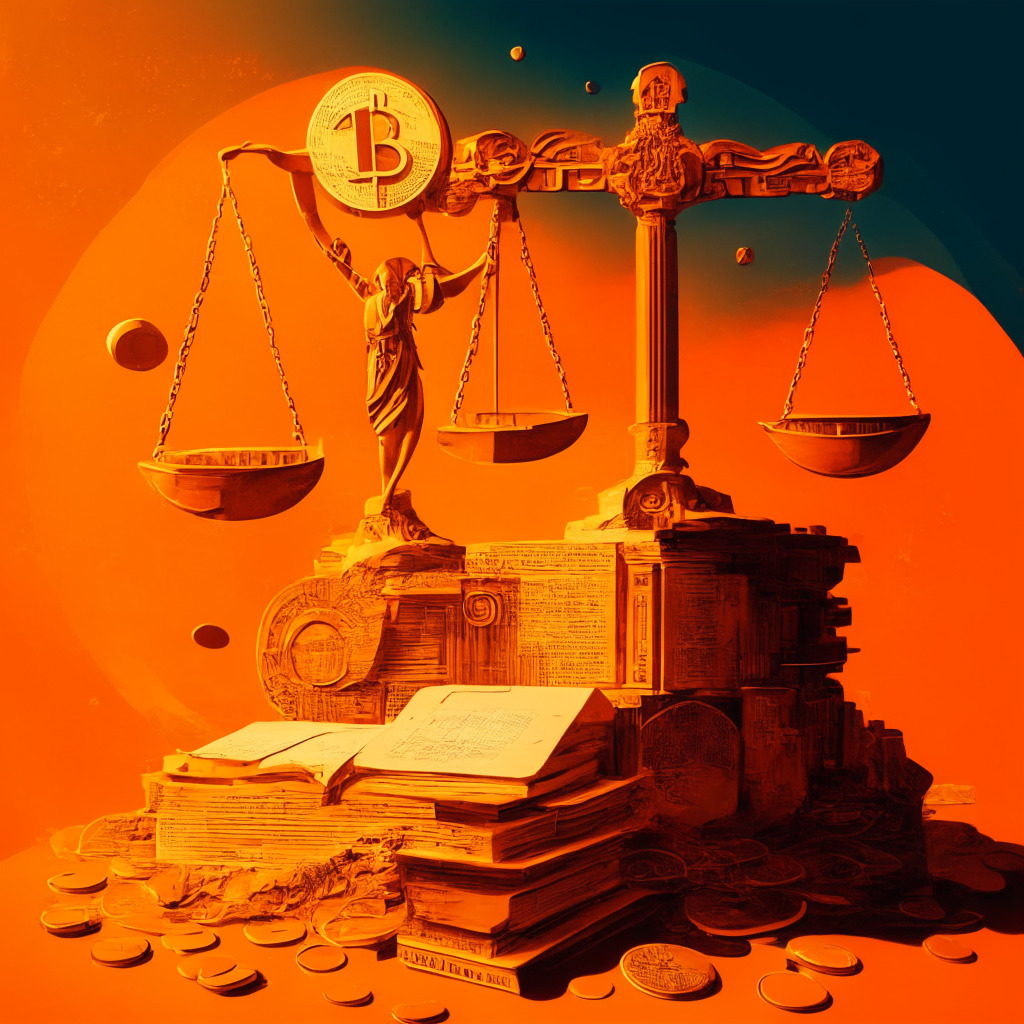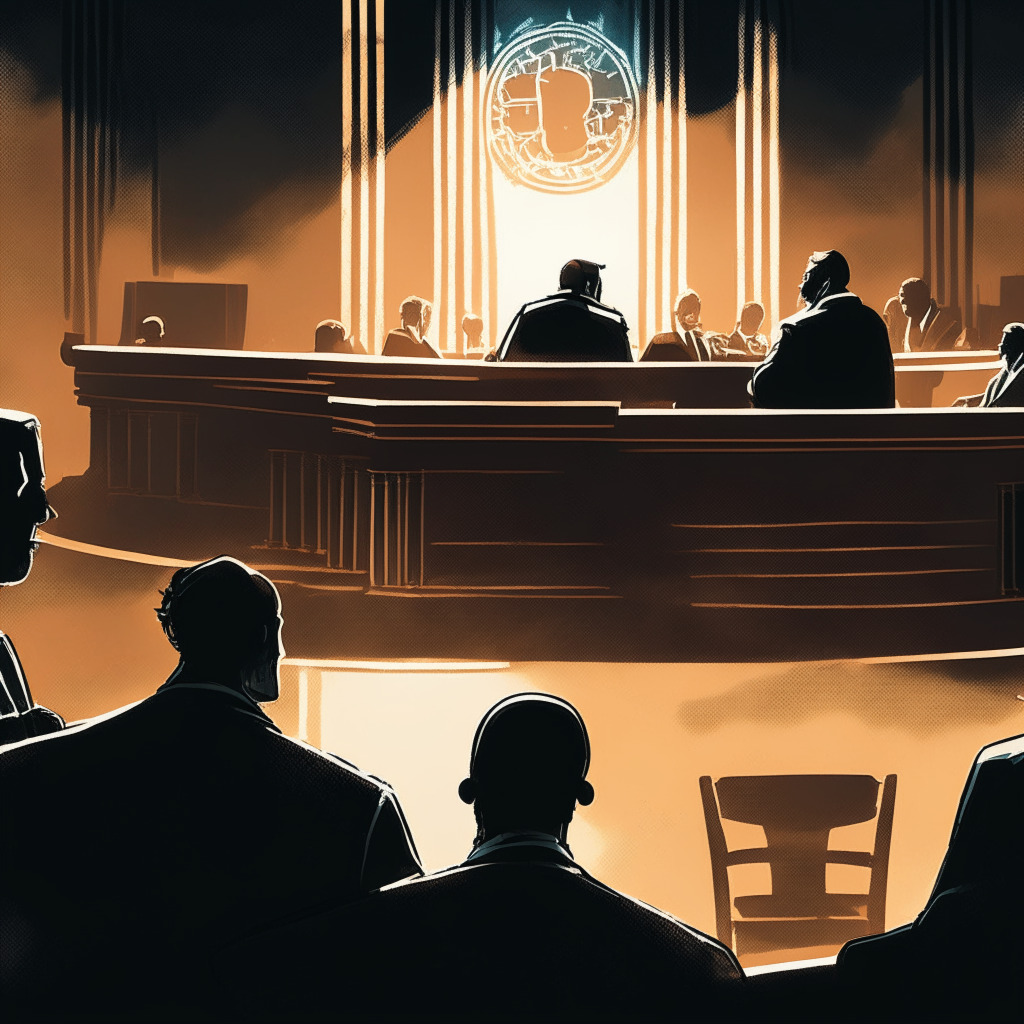Senators Kirsten Gillibrand and Cynthia Lummis have introduced a new crypto bill, the Responsible Financial Innovation Act, aimed at addressing regulatory ambiguity in the US cryptocurrency industry. This legislation could shift the oversight of most digital assets from SEC to the Commodity Futures Trading Commission.
Search Results for: U.S. Securities and Exchange Commission
The Crypto Defection: Continual Market Outflows and Defiant Altcoins Gaining Traction
“Crypto investment products have experienced outflows for the sixth consecutive week, with Bitcoin and Ethereum bearing major losses. However, XRP and Solana have shown resilience, with net inflows recorded. Regional differences between European and U.S. investors also highlight the impact of regulatory climates on crypto investments.”
Exploring the Relationship between the Federal Reserve and Bitcoin: Shifts, Correlations, and Projections
The Federal Reserve’s decisions are impacting Bitcoin, causing a 4% value decline over the week. This dip coincides with unchanged federal interest rates. Observers note an increasingly inverse correlation between Bitcoin and the U.S dollar. However, Bitcoin enthusiasts anticipate growth from potential Bitcoin ETF approval.
Crypto Week Review: Binance vs SEC, Tether Lifeline for Tron and Controversy at FTX
This article explores recent developments in the crypto world, including the SEC’s setback in their investigation into Binance.US, the proposed dismissal of a lawsuit against Binance and its CEO, and delay in repayments by defunct exchange Mt. Gox. Noteworthy is Tether’s decision to authorize $1 billion USDT to the Tron network, a lawsuit against FTX founder’s parents, and Grayscale filing for a new Ether futures ETF.
Unraveling the Binance vs SEC Saga: A Landmark Battle in Crypto Regulation
Binance, Binance.US, and Changpeng Zhao are legally challenging the U.S. Securities and Exchange Commission, arguing it overstepped its bounds. The crux of the conflict lies in the question of whether the SEC has the right to retroactively regulate the emerging crypto markets. Binance contends that the SEC should have established clear crypto sector guidelines before taking legal action. They also challenge the SEC’s attempt to hold them accountable for crypto asset sales dating back to July 2017, during a time of unclear regulatory norms for crypto.
JPEX Exchange Halts Operations: A Setback or a Gateway to Decentralized Future?
The Hong Kong cryptocurrency exchange, JPEX, has temporarily ceased operations due to a legal probe by the Securities and Futures Commission, resulting in the arrest of a key person. JPEX, operating without a local license, has faced user grievances and is also undergoing friction in Taiwan with affiliated influencers.
Navigating the Storm: Binance’s Legal Challenges and the Future of Crypto Regulation
Binance CEO, Changpeng Zhao dismisses rumors of Binance.US CEO, Brian Shroder’s departure amidst legal issues involving the SEC and CFTC. He notes Shroder’s significant contributions to the platform’s resilience and growth, despite growing legal and regulatory challenges. Binance.US recently appointed Norman Reed as the new CEO.
Gemini vs DCG: Unmasking the Gray Areas in Crypto Markets Regulation and Accountability
Gemini’s legal team recently accused Digital Currency Group (DCG) of manipulative tactics against Genesis creditors amid bankruptcy proceedings. DCG’s proposed recovery plan for creditors has been deemed misleading, potentially underpaying Gemini with a lower settlement offer. This discord underscores the significance of clear regulations and accountability in the crypto market.
Escalating Tensions Between SEC and Binance.US: Pros, Cons, and the Underlying Blockchain Battle
The U.S. Securities and Exchange Commission (SEC) accuses Binance.US and BAM of possibly violating federal securities laws due to their staking, clearing, and brokerage services. The SEC’s concern revolves around Binance.US’ reliance on a custody provider, Ceffu, potentially leading to violations of prior agreements. Binance.US denies any wrongdoing, while regulation pressure continues to increase. This situation illustrates a broader discussion surrounding crypto regulation nuances, transparency, investor protection, and maintaining decentralization.
Sweeping Exits and Legal Challenges: Decrypting the Binance.US Saga
“In the face of increasing legal challenges, two more senior executives have left their roles at Binance.US, following the departure of CEO Brian Shroder. The ongoing regulatory scrutiny has invoked potential investigations by the SEC and DOJ, addressing allegations of unregistered securities operations. These developments underline the escalating cryptocurrency compliance demands and their inevitable impact on market confidence and dynamics.”
Regulatory Tightrope: Striking Balance between Crypto Transparency and Investor Safety
U.S. Sen. Sherrod Brown’s call to regulators for promoting transparency and safeguarding investor interests suggests a push for stronger authority over digital assets. This results in questioning the readiness of the crypto enthusiasts to embrace potential regulatory changes in the crypto realm.
Navigating the Web3 Revolution: Grab and Circle’s Leap of Faith Amidst Regulatory Uncertainty
“Grab, Southeast Asia’s largest tech startup, has partnered with Circle to bring Web3 services to Singapore through ‘Grab Web3 Wallet’, encouraging the adoption of stablecoins, digital assets, and smart contracts. However, this move comes amidst a market environment filled with regulatory uncertainty, particularly concerning digital currencies, causing us to question whether these technologies will be allowed to flourish or be stifled by regulation.”
Regulatory Gauntlet: Crypto’s Confrontation with Dated Securities Laws
“Crypto’s audacious defiance of conventional regulatory frameworks is drawing widespread regulatory attention. Enforcement activities now target leading crypto entities, leveraging laws up to 90 years old. As scrutiny increases, the key question is what will crumble first – our dated securities laws or the crypto industry itself?”
Regulatory Scrutiny vs Technological Advancements: Navigating the Complex Crypto Landscape
Despite regulatory challenges and hacking threats, the crypto sphere continues to innovate, with enhanced privacy, user experience, and transaction efficiency. As Ethereum plans a major transformation and Ripple maintains its legal standing, the tokenized assets market could reach $16 billion by 2030. However, effective regulation remains vital to safeguard all stakeholders.
Navigating Rough Waters: Crypto Exchanges and Market Liquidity Amidst Regulatory Pressure
“The world of cryptocurrency is experiencing significant change amidst SEC scrutiny and exchange turbulence. Key developments include the unexpected departure of Binance.US’s CEO, BitMEX’s introduction of a prediction market, and concerns around FTX’s proposed changes in crypto assets.”
U.S. Regulatory Hurdles: Driving Crypto Startups Towards Friendlier Shores?
“Ripple’s CEO, Brad Garlinghouse, argues that the U.S. is the worst country for crypto start-ups due to its hesitance towards digital asset innovation. He highlights the UK, Singapore, UAE, and Switzerland as nations nurturing such innovation. Aggressive lawsuits by SEC and CFTC complicate the implementation of crypto regulations in the U.S., possibly inducing a mass exodus of blockchain startups to friendlier jurisdictions.”
Telegram’s Intertwined Saga with TON: Scandal, Redemption, and a Future in Balance
“Telegram has extended support for the TON network, boosting its token price by 7%. Once abandoned amid legal issues with the U.S. Securities and Exchange Commission, the TON blockchain was redeemed by community members who formed the TON Foundation.”
Crypto Cold War: Navigating Regulations and Market Opportunities in the United States
Ripple’s CEO, Brad Garlinghouse, asserts the U.S. is one of the worst places for starting a crypto business due to regulatory issues. Despite legal victories, regulatory clarity remains elusive, leading Ripple to consider countries with more crypto-friendly policies. This invariably poses a dilemma for crypto businesses when regulations contradict market opportunities.
Future of Crypto Regulation: Senator Sherrod Brown’s Stand and Potential Impacts on the Industry
Senator Sherrod Brown’s stern views on crypto industry as riddled with deceit and exploitation is affecting the future of crypto regulation in the U.S. Brown directs the Senate Banking Committee, highlighting troubling aspects like inadequate disclosure, interest conflicts, and high-risk bets in the industry. Without Brown’s approval, comprehensive crypto market oversight seems unlikely.
Navigating the Regulatory Tug of War: Binance and SEC’s Standoff about the Future of Crypto
“Binance.US has labelled SEC’s call for executive depositions and additional discovery to be overly burdensome and indiscriminate. Accusations allege the CEO of Binance and Guangying ‘Helina’ Chen channeled billions in customer funds through third-party companies, with Binance refuting these claims. The standoff brings scrutiny to SEC’s regulation of the crypto industry, raising concerns about overstepped regulatory boundaries and stifling innovation.”
Clash of Titans: SEC’s Gensler’s Crypto Apprehensions and the Ongoing Crypto-securities Law Drama
U.S. Securities and Exchange Commission Chair, Gary Gensler, stands firm on his belief that most crypto tokens likely qualify as investment contracts under the law, making them subject to securities laws. Despite recent court decisions favoring crypto entities like Ripple, Gensler remains focussed on the noncompliance of the crypto sector with these laws, fuelling ongoing crypto-securities law conflicts.
Navigating Through Binance Exodus, Nasdaq’s AI, and Crypto Industry Legal Drama: What’s Next?
“Binance continues to lose key figures amid regulatory woes, sparking questions about its future, despite CEO assurances. Nasdaq’s first AI-driven order type has SEC approval, signaling a significant technological shift in trading. The crypto industry wrestles with legal issues and regulation debates, highlighting a resilient sector skilled at innovation amid regulatory challenges.”
SEC vs Ripple Labs: A Twisted Tale of Cryptocurrency Regulations and Legal Ambiguity
“In a recent development, the U.S. SEC has challenged the court’s previous decision that XRP was not a security when sold to retail investors. However, the SEC’s move has been critiqued as contradictory, considering past statements by the agency asserting the sufficiency of existing crypto regulations. The case’s outcome could significantly impact the crypto market.”
Dissecting the ETHE to ETF Transformation: Fluctuating Markets, Investor Sentiment and Projections
As reported by CryptoQuant data, the regulatory filing of a spot ether exchange-traded fund (ETF) has triggered a reduction in the Grayscale Ethereum Trust’s discount to net asset value. This anticipated shift could potentially transform Ethereum’s future, fueling speculation about Grayscale converting its product into an ETF. Whether the transition will obliterate the discount to zero remains uncertain due to fluctuating investor sentiment.
Navigating the Wave: How Binance Battles Rumors, Regulations and Employee Departure
Binance CEO, Changpeng Zhao, has dismissed rumors about financial instability, insisting the platform has “no liquidity issues.” Despite multiple executive departures, Zhao maintains that all customer funds are secure, pointing to recent crypto industry victories and expansions as positive indicators.
Navigating the Crypto Regulatory Tightrope: Balancing Innovation and Investor Protection
U.S. Commodity Futures Trading Commission’s Commissioner, Caroline Pham, calls for a limited pilot program to help the U.S. catch up with crypto-friendly regulatory frameworks. Pham’s proposed program would foster open, transparent, competitive crypto markets while ensuring retail investor protection. The balance between innovation and regulations is crucial for a sustainable crypto future.
Swiss Sheltering TON Foundation: Non-Profit Evolution, Regulatory Transformations, and Crypto Exodus
“The Open Network (TON) blockchain has pivoted into a Swiss-based non-profit, focusing on fostering the TON ecosystem and broadening its adoption. The TON Foundation plans to stimulate TON-centric scholarly and creative ventures, while making strides towards transparency and community-driven governance in a quest to become the primary platform for Web3 dapps.”
New FASB Standards Redefine Corporate Cryptocurrency Adoption: A Boon or a Bane?
“The Financial Accounting Standards Board (FASB) in the U.S. greenlit new standards requiring firms to apply a fair-value approach to certain cryptocurrencies. These standards promise more transparency for investors and could potentially facilitate broader corporate cryptocurrency adoption despite potential earnings volatility for businesses with substantial crypto assets.”
Pros and Cons of Possible Spot Ethereum ETFs Launch in the US: An In-Depth Analysis
“The crypto markets buzz amidst ‘official’ steps towards the launch of spot Ethereum exchange-traded funds (ETFs) in the U.S., initiated by VanEck and ARK. This could open new opportunities for investors, despite potential risks like market volatility and regulatory delays.”
Groundbreaking: U.S. Poised for First Spot Ether ETFs – A Game Changer or A Risk Too Far?
“Cboe’s BZX exchange is preparing for a historical first with the potential launch of the U.S.’s maiden spot ether exchange-traded funds (ETFs). The SEC’s approval of such a move would mark a new era of crypto trading, including on-the-spot ether exchanges via ETFs. The decision may reshape the financial landscape, creating a new entry point for traditional investors into the realm of digital currency.”
Coinbase Ups the Ante: $180 Million Bond Buyback Strategy and Its Implications
Coinbase plans to expand its bond buyback program to $180 million from the previous $150 million, increasing efforts to repurchase more of its 3.625% senior notes due in 2031. The company also aims to offer crypto loans to institutional investors amid a tumultuous lending scenario. These strategic efforts aim to solidify its position in the evolving crypto market.
Deflecting the Blame: Uniswap Wins Case and Stirs Up Security Law Decisions in Crypto World
“A class action lawsuit against decentralized crypto exchange, Uniswap, was dismissed due to the unclear path for plaintiffs suing over alleged “scam tokens”. The judge argued that the issuers of these tokens were the culprits, not Uniswap. The case highlighted a legal quandary in identifying responsible parties amidst the anonymous, decentralized nature of crypto protocols, further clouding the jurisdiction and regulatory role of bodies like the SEC. The outcome implies that software creators could evade liability for misuse of their platforms.”































